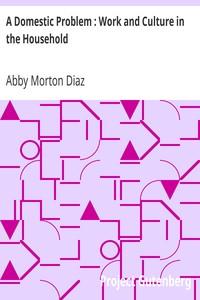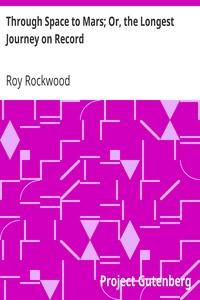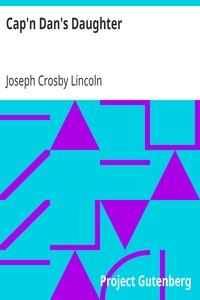Read this ebook for free! No credit card needed, absolutely nothing to pay.
Words: 132768 in 28 pages
This is an ebook sharing website. You can read the uploaded ebooks for free here. No credit cards needed, nothing to pay. If you want to own a digital copy of the ebook, or want to read offline with your favorite ebook-reader, then you can choose to buy and download the ebook.
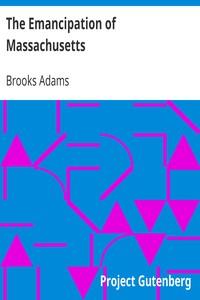

: The Emancipation of Massachusetts by Adams Brooks - Puritans Massachusetts; Massachusetts History Colonial period ca. 1600-1775; Massachusetts Church history
PREFACE TO NEW EDITION.
I wrote this little volume more than thirty years ago, since when I have hardly opened it. Therefore I now read it almost as if it were written by another man, and I find to my relief that, on the whole, I think rather better of it than I did when I published it. Indeed, as a criticism of what were then the accepted views of Massachusetts history, as expounded by her most authoritative historians, I see nothing in it to retract or even to modify. I do, however, somewhat regret the rather acrimonious tone which I occasionally adopted when speaking of the more conservative section of the clergy. Not that I think that the Mathers, for example, and their like, did not deserve all, or, indeed, more than all I ever said or thought of them, but because I conceive that equally effective strictures might have been conveyed in urbaner language; and, as I age, I shrink from anything akin to invective, even in what amounts to controversy.
The last generation was strongly Darwinian in the sense that it accepted, almost as a tenet of religious faith, the theory that human civilization is a progressive evolution, moving on the whole steadily toward perfection, from a lower to a higher intellectual plane, and, as a necessary part of its progress, developing a higher degree of mental vigor. I need hardly observe that all belief in democracy as a final solution of social ills, all confidence in education as a means to attaining to universal justice, and all hope of approximating to the rule of moral right in the administration of law, was held to hinge on this great fundamental dogma, which, it followed, it was almost impious to deny, or even to doubt. Thus, on the first page of my book, I observe, as if it were axiomatic, that, at a given moment, toward the opening of the sixteenth century, "Europe burst from her mediaeval torpor into the splendor of the Renaissance," and further on I assume, as an equally self-evident axiom, that freedom of thought was the one great permanent advance which western civilization made by all the agony and bloodshed of the Reformation. Apart altogether from the fact that I should doubt whether, in the year 1919, any intelligent and educated man would be inclined to maintain that the twelfth and thirteenth centuries were, as contrasted with the nineteenth, ages of intellectual torpor, what startles me in these paragraphs is the self-satisfied assumption of the finality of my conclusions. I posit, as a fact not to be controverted, that our universe is an expression of an universal law, which the nineteenth century had discovered and could formulate.
During the past thirty years I have given this subject my best attention, and now I am so far from assenting to this proposition that my mind tends in the opposite direction. Each day I live I am less able to withstand the suspicion that the universe, far from being an expression of law originating in a single primary cause, is a chaos which admits of reaching no equilibrium, and with which man is doomed eternally and hopelessly to contend. For human society, to deserve the name of civilization, must be an embodiment of order, or must at least tend toward a social equilibrium. I take, as an illustration of my meaning, the development of the domestic relations of our race.
I assume it to be generally admitted, that possibly man's first and probably his greatest advance toward order--and, therefore, toward civilization--was the creation of the family as the social nucleus. As Napoleon said, when the lawyers were drafting his Civil Code, "Make the family responsible to its head, and the head to me, and I will keep order in France." And yet although our dependence on the family system has been recognized in every age and in every land, there has been no restraint on personal liberty which has been more resented, by both men and women alike, than has been this bond which, when perfect, constrains one man and one woman to live a joint life until death shall them part, for the propagation, care, and defence of their children.
And so it has been since a time transcending the limits of imagination. Here in a half-a-dozen sentences Saint Paul exposes the ceaseless conflict between mind and matter, whose union, though seemingly the essence of life, creates a condition which we cannot comprehend and to which we could not hope to conform, even if we could comprehend it. In short, which indicates chaos as being the probable core of an universe from which we must evolve order, if ever we are to cope with violence, fraud, crime, war, and general brutality. Wheresoever we turn the prospect is the same. If we gaze upon the heavens we discern immeasurable spaces sprinkled with globules of matter, to which our earth seems to be more or less akin, but all plunging, apparently, both furiously and aimlessly, from out of an infinite past to an equally immeasurable future.
Whence this material mass comes, or what its wild flight portends, we neither know nor could we, probably, comprehend even were its secret divulged to us by a superior intelligence, always conceding that there be such an intelligence, or any secret to disclose. These latter speculations lie, however, beyond the scope of my present purpose. It suffices if science permits me to postulate that matter, as we know it, has the semblance of being what we call a substance, charged with a something which we define as energy, but which at all events simulates a vital principle resembling heat, seeking to escape into space, where it cools. Thus the stars, having blazed until their vital principle is absorbed in space, sink into relative torpor, or, as the astronomers say, die. The trees and plants diffuse their energy in the infinite, and, at length, when nothing but a shell remains, rot. Lastly, our fleshly bodies, when the union between mind and matter is dissolved, crumble into dust. When the involuntary partnership between mind and matter ceases through death, it is possible, or at least conceivable, that the impalpable soul, admitting that such a thing exists, may survive in some medium where it may be free from material shackles, but, while life endures, the flesh has wants which must be gratified, and which, therefore, take precedence of the yearnings of the soul, just as Saint Paul points out was the case with himself; and herein lies the inexorable conflict between the moral law and the law of competition which favors the strong, and from whence comes all the abominations of selfishness, of violence, of cruelty and crime.
Approached thus, perhaps no historical fragment is more suggestive than the exodus of the Jews from Egypt under Moses, who was the first great optimist, nor one which is seldomer read with an eye to the contrast which it discloses between Moses the law-giver, the idealist, the religious prophet, and the visionary; and Moses the political adventurer and the keen and unscrupulous man of the world. And yet it is here at the point at which mind and matter clashed, that Moses merits most attention. For Moses and the Mosaic civilization broke down at this point, which is, indeed, the chasm which has engulfed every progressive civilization since the dawn of time. And the value of the story as an illustration of scientific history is its familiarity, for no Christian child lives who has not been brought up on it.
We have all forgotten when we first learned how the Jews came to migrate to Egypt during the years of the famine, when Joseph had become the minister of Pharaoh through his acuteness in reading dreams. Also how, after their settlement in the land of Goshen,--which is the Egyptian province lying at the end of the ancient caravan road, which Abraham travelled, leading from Palestine to the banks of the Nile, and which had been the trade route, or path of least resistance, between Asia and Africa, probably for ages before the earliest of human traditions,--they prospered exceedingly. But at length they fell into a species of bondage which lasted several centuries, during which they multiplied so rapidly that they finally raised in the Egyptian government a fear of their domination. Nor, considering subsequent events, was this apprehension unreasonable. At all events the Egyptian government is represented, as a measure of self-protection, as proposing to kill male Jewish babies in order to reduce the Jewish military strength; and it was precisely at this juncture that Moses was born, Moses, indeed, escaped the fate which menaced him, but only by a narrow chance, and he was nourished by his mother in an atmosphere of hate which tinged his whole life, causing him always to feel to the Egyptians as the slave feels to his master. After birth the mother hid the child as long as possible, but when she could conceal the infant no longer she platted a basket of reeds, smeared it with pitch, and set it adrift in the Nile, where it was likely to be found, leaving her eldest daughter, named Miriam, to watch over it. Presently Pharaoh's daughter came, as was her habit, to the river to bathe, as Moses's mother expected that she would, and there she noticed the "ark" floating among the bulrushes. She had it brought her, and, noticing Miriam, she caused the girl to engage her mother, whom Miriam pointed out to her, as a nurse. Taking pity on the baby the kind-hearted princess adopted it and brought it up as she would had it been her own, and, as the child grew, she came to love the boy, and had him educated with care, and this education must be kept in mind since the future of Moses as a man turned upon it. For Moses was most peculiarly a creation of his age and of his environment; if, indeed, he may not be considered as an incarnation of Jewish thought gradually shaped during many centuries of priestly development.
According to tradition, Moses from childhood was of great personal beauty, so much so that passers by would turn to look at him, and this early promise was fulfilled as he grew to be a man. Tall and dignified, with long, shaggy hair and beard, of a reddish hue tinged with gray, he is described as "wise as beautiful." Educated by his foster-mother as a priest at Heliopolis, he was taught the whole range of Chaldean and Assyrian literature, as well as the Egyptian, and thus became acquainted with all the traditions of oriental magic: which, just at that period, was in its fullest development. Consequently, Moses must have been familiar with the ancient doctrines of Zoroaster.
Men who stood thus, and had such an education, were called Wise Men, Magi, or Magicians, and had great influence, not so much as priests of a God, as enchanters who dealt with the supernatural as a profession. Daniel, for example, belonged to this class. He was one of three captive Jews whom Nebuchadnezzar, King of Babylon, gave in charge to the master of his eunuchs, to whom he should teach the learning and the tongue of the Chaldeans. Daniel, very shortly, by his natural ability, brought himself and his comrades into favor with the chief eunuch, who finally presented them to Nebuchadnezzar, who conversed with them and found them "ten times better than all the magicians and astrologers that were in all his realm."
The end of it was, of course, that Nebuchadnezzar dreamed a dream which he forgot when he awoke and he summoned "the magicians, and the astrologers, and the sorcerers, and the Chaldeans, for to shew the king his dreams," but they could not unless he told it them. This vexed the king, who declared that unless they should tell him his dream with the interpretation thereof, they should be cut in pieces. So the decree went forth that all "the wise men" of Babylon should be slain, and they sought Daniel and his fellows to slay them. Therefore, it appears that together with its privileges and advantages the profession of magic was dangerous in those ages. Daniel, on this occasion, according to the tradition, succeeded in revealing and interpreting the dream; and, in return, Nebuchadnezzar made Daniel a great man, chief governor of the province of Babylon.
Free books android app tbrJar TBR JAR Read Free books online gutenberg
More posts by @FreeBooks

: Mrs. Shelley by Rossetti Lucy Madox Brown - Authors English 19th century Biography; Shelley Mary Wollstonecraft 1797-1851; Women and literature England History 19th century
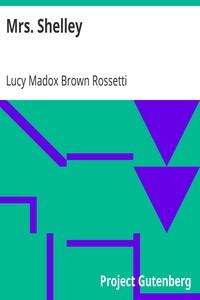

: A Domestic Problem : Work and Culture in the Household by Diaz Abby Morton - Women Social and moral questions
